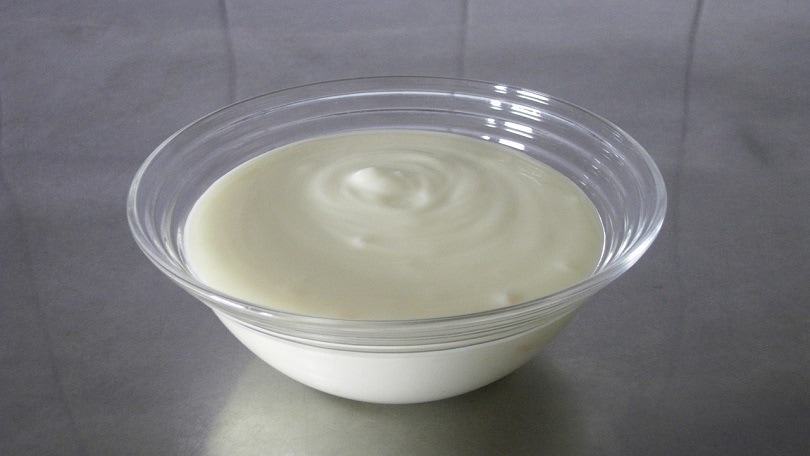Can Dogs Eat Activia Yogurt? Vet-Reviewed Health Concerns
Updated on

Dogs tend to enjoy just about any kind of food that they can get their paws on. If their human companions aren’t offering anything, the trash can begin to look pretty good to many canines! So, it should not come as a surprise if your dog shows interest in the Activia yogurt that you are eating for breakfast or as a snack.
The question is, can your pup eat Activia yogurt? The short answer is yes, most dogs can safely enjoy a small amount of plain, xylitol free Activia yogurt on occasion. However, there are important considerations to make before deciding whether it’s worth giving this treat to your furry family member. Here’s what you should know.
The Benefits of Probiotics for Dogs
There is increasing awareness in people of the importance of the gut microbiome and it’s the same for our dogs. This is like a mini ecosystem of mainly bacteria in their guts that is unique to them.
The World Health Organization defines probiotics as ‘live microorganisms which when administered in adequate amounts confer a health benefit’. In more simple terms they are often referred to as ‘good’ or ‘friendly’ bacteria.
While the research is still limited and sometimes contradictory, there is evidence that probiotics can benefit a dog’s health in various ways.1 First, just like for humans, probiotics can help improve gut health, improving the digestion of nutrients and helping alleviate gastrointestinal problems like diarrhea.
Studies have also shown that some species of probiotics can also support the immune system and help prevent and reduce stress and anxiety. A dog’s gastrointestinal tract is constantly communicating with the brain, so a healthy gut flora can help regulate emotions and overall mental health.
So the probiotics found in certain yogurts such as Activia may have some benefits for dogs, but there are better sources of probiotics for them. Read on to find out why it may be okay to feed Activia yogurt to your pup occasionally, but what things to consider and flavors should be off-limits to dogs altogether.

Does Activia Yogurt Contain Probiotics?
Activia does contain probiotics. These live bacterial cultures that have health benefits to humans. In the case of Activia yogurt these are Streptococcus thermophilus, Lactobacillus bulgaricus, Bifidus ActiRegularis and Lactococcus lactis.
Do Other Yogurts Contain Probiotics?
All yogurts are made by introducing live cultures of friendly bacteria to plain milk (usually pasteurized). Some yogurts are pasteurized (heat treated) again afterwards which can make them more stable and have a longer shelf life, but it will kill the probiotic bacteria. The best way to check is to look at the label to see if they contain probiotics or live culture.
Can Dogs Eat Plain and Flavored Activia Yogurt?
Plain yogurt is always best when it comes to feeding it to your dog. Flavored options may contain too much sugar or other ingredients that are not great for your pup’s digestive system. The yogurt should not contain flavors and sweeteners, so it’s best to check the ingredients label for added ingredients.
Chocolate yogurt should never be offered to your dog. A compound called theobromine found in chocolate (and caffeine) is toxic to dogs. Canines cannot properly metabolize theobromine, which makes them sensitive to the effects that this compound tends to create. Signs of chocolate toxicity in dogs include diarrhea, vomiting, increased thirst, restlessness, excessive urination, and an elevated heart rate. Although the amount of theobromine in chocolate yogurt is generally low, it’s not worth taking the risk and you should avoid sharing it with your pup altogether.

How Often Should Dogs Eat Activia Yogurt?
Activia yogurt should never be a regular or large part of your dog’s diet. It doesn’t contain anything that your dog needs for a happy and healthy life that they can’t get from their regular meals. There are other ways to ensure that your dog gets the probiotics that they need for good health and are suitable as a regular supplement if required. Feeding your dog too much yogurt can interfere with their appetite when it comes time to eat a real meal that provides all the nutrients needed.
Activia yogurt—or any kind of yogurt, for that matter—should be treated as an occasional snack or supplement. You can give your pup a spoonful once or twice a week, but the rest of their diet should be made up of high-quality balanced dog food and snacks that are more appropriate.
Always Avoid Activia Yogurt Made With Artificial Sweeteners
All yogurt, including Activia, that contains artificial sweeteners should be avoided when feeding this food to a dog. While some artificial sweeteners are considered safe for dogs, they can all cause gastrointestinal distress. Xylitol, a popular artificial sweetener added to low-calorie and sugar-free products (including yogurt), is extremely dangerous for dogs to consume. Even small amounts of it can lead to dangerously low blood sugar levels, seizures, liver failure and even death. Therefore, it’s best to stay away from “sugar-free” products and those that include artificial sweeteners when choosing foods to share with your dog.

Be Aware of Possible Side Effects
Many dogs are lactose intolerant and have a hard time digesting dairy, so consuming yogurt even when probiotics are present can result in loose stools, gas, vomiting, and abdominal pain. Some dogs are more tolerant to yogurt than they are to milk (as it contains less lactose), so yours might do fine with a few bites of yogurt as an occasional snack. If your dog shows any signs of lactose intolerance, it’s a good idea to avoid continuing to give them yogurt or other dairy products.
Other Effective Ways to Provide Your Pup With Probiotics
While dogs can take human probiotics such as those contained in Activia, they may not be as beneficial as supplements that have been formulated to be especially for dogs, especially in the amounts of yogurt that are suitable to feed your dog. If you feel that your pup may benefit from a probiotic supplement, speak to your vet for advice to choose the right one as there are lots of options. Certain commercial dog food brands add probiotics to their formulas that help ensure that an efficient number of good bacteria thrive in the gut and digestive system. Other options include:
- Probiotic Treats — Commercially made probiotic treats are usually soft chews that dogs can enjoy as supplements.
- Probiotic Pills — Canine probiotics that come in capsule form can be given to your dog as a supplement. Just hide the pill in a small serving of xylitol peanut butter or a “pill pocket,” and your pup is sure to eat it right up.
- Probiotic Powder — You can pour canine probiotic powder onto your dog’s food as a supplement, many are very palatable but some dogs may need it to be hidden in wet food.

A Quick Recap
Dogs can eat Activia yogurt as an occasional snack or treat, but it should not make up a large part of their diet. It’s important to avoid yogurt that contains added sugars and artificial sweeteners, especially xylitol. It’s also a good idea to keep an eye on your dog for signs of lactose intolerance after feeding them dairy products like yogurt. There are many dog specific products on the market that can provide your pup with probiotics if they’re needed. Your vet is your best source of advice and help when choosing the best option for your dog.
See also:
- Can Dogs Eat Injera? Vet-Reviewed Health Concerns
- Can Dogs Eat Lion’s Mane Mushrooms? Vet-Approved Facts & FAQ
Featured Image Credit: New Africa, Shutterstock













